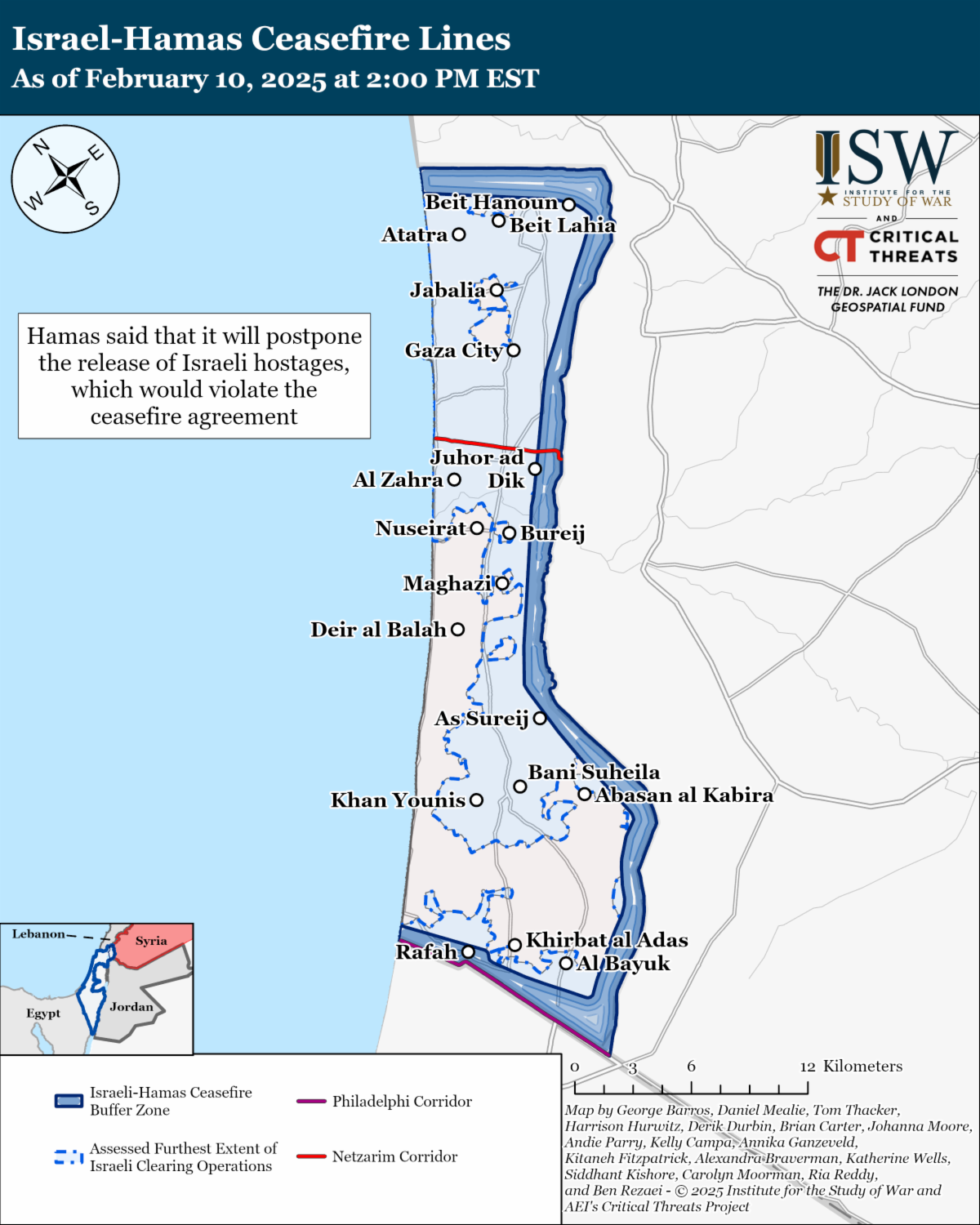Hamas said on February 10 that it would postpone the release of Israeli hostages on February 15, which would be a violation of the ceasefire agreement. Hamas likely aims to retain its hostages as leverage in negotiations. Hamas’ military wing spokesperson claimed that Israel violated the ceasefire agreement by delaying the return of Gazans to the northern Gaza Strip, targeting them with gunfire, and restricting the flow of aid into the Gaza Strip. These claims are misleading. Israel delayed the movement of Gazans to the northern strip in January 2025 because Hamas did not release a female civilian hostage before releasing female soldier hostages, as required under the ceasefire agreement. Israeli forces have fired warning shots at Palestinians, but warning shots are a normal part of most escalation-of-force procedures in professional militaries. Israel has also provided at least an average of 555 aid trucks per day to Gazans, which is an increase from 70 trucks per day in early January 2025, before the ceasefire. Israel has responded to Hamas’ threat to violate the ceasefire agreement. Israeli Defense Minister Israel Katz instructed the Israel Defense Forces (IDF) to prepare for any “possible scenario” in the Gaza Strip in response to Hamas’ ceasefire violations.
US President Donald Trump said on February 10 that the United States will “build a permanent place” for Gazans outside the Gaza Strip. Trump added that he will negotiate with Jordan and Egypt to accept Gazan refugees even though both countries have rejected the proposal. The Egyptian Foreign Ministry announced on February 9 that Egypt will host an emergency Arab League summit on February 27 in Cairo to discuss “new and dangerous developments” following Trump’s statement on Gaza. Iranian Foreign Affairs Minister Abbas Araghchi also called for an emergency Organization of Islamic Cooperation (OIC) meeting in separate phone calls with OIC Secretary General Hussein Ibrahim Taha, and the Tunisian, Egyptian, and Malaysian foreign ministers on February 9 and 10.
Palestinian Authority (PA) President Mahmoud Abbas issued a decree on February 10 that restructured legislation that provided payments to Palestinian fighters in the West Bank who were arrested by Israeli forces or died while conducting an attack. The restructured legislation will provide social welfare funding to Palestinians based on socio-economic status rather than allowances based on “prisoner or martyr” status. This legislation formerly provided payment to Palestinian fighters arrested by Israeli security forces based on the length of their prison sentence. Various Israeli and American administrations referred to this system as “pay-to-slay.” A Palestinian official told Axios that the decree transfers the cash assistance program, database, and allocations from the PA Ministry of Social Development to the Palestinian National Foundation for Economic Empowerment, an “independent institution” focused on reducing poverty and addressing unemployment. Abbas founded the organization in 2019.
Key Takeaways:
- Gaza Strip Ceasefire: Hamas said that it will postpone the release of Israeli hostages on February 10, which would be a violation of the ceasefire agreement. Hamas likely seeks to retain leverage in part because it believes that retaining the hostages will be key to pressure Israel and the United States to move forward with the second phase of negotiations. This negotiating strategy seeks to save Hamas as an organization rather than defend Palestinians or Gaza.
- West Bank: Palestinian Authority (PA) President Mahmoud Abbas issued a decree on February 10 that restructured legislation that provided payments to Palestinian fighters in the West Bank who were arrested by Israeli forces or died while conducting an attack.
- Iran: Iranian officials who had previously supported nuclear negotiations with the United States explicitly supported Supreme Leader Ali Khamenei's decision to reject nuclear negotiations with the United States on February 10. These officials included Iranian Foreign Affairs Minister Abbas Araghchi, who worked on nuclear negotiations with the West under the Rouhani administration and remained a key supporter of negotiations.
| 




 [ISW] 러시아의 공세 캠페인 평가, 2025년 3월 27일
[ISW] 러시아의 공세 캠페인 평가, 2025년 3월 27일
 [ISW] 이란 업데이트, 2025년 1월 27일
[ISW] 이란 업데이트, 2025년 1월 27일